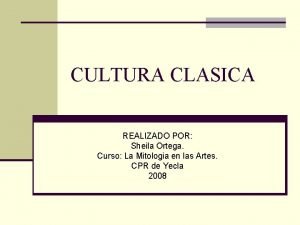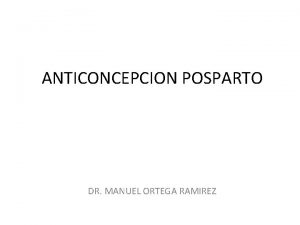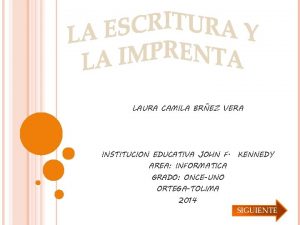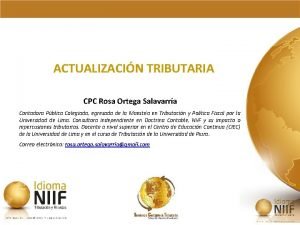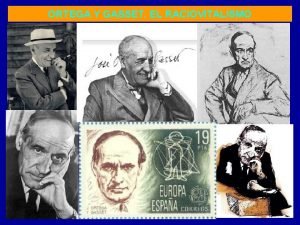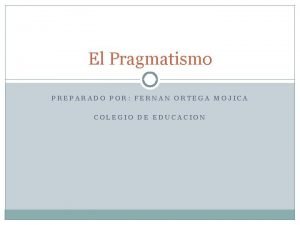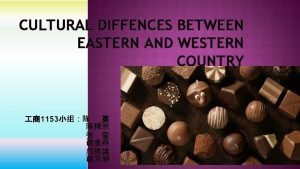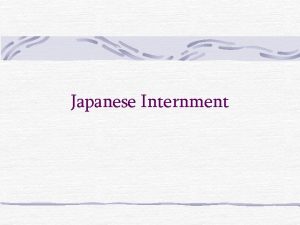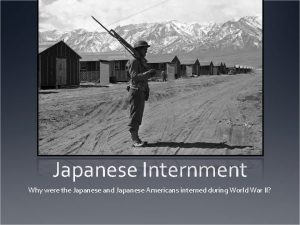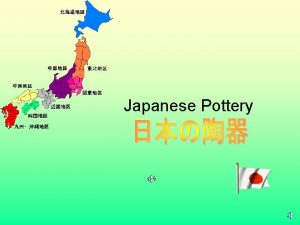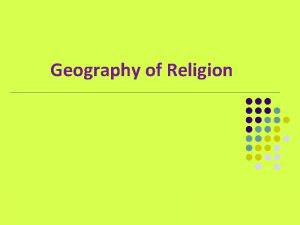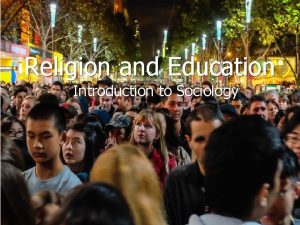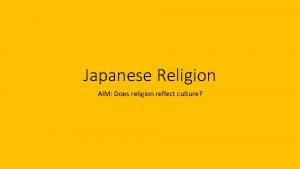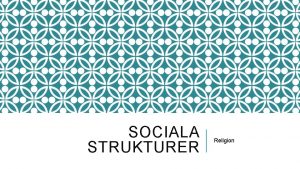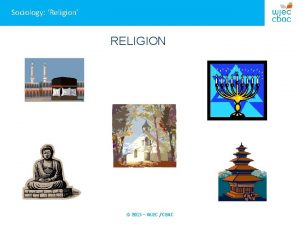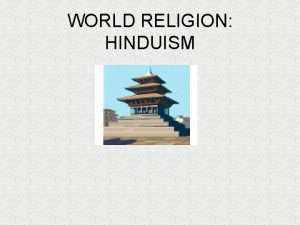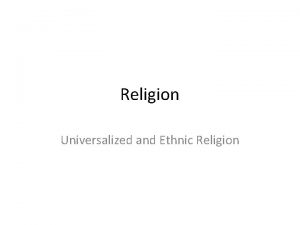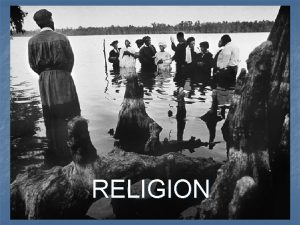Japanese Religion Anthony Ortega Introduction Japanese Religion consists




















- Slides: 20

Japanese Religion Anthony Ortega

Introduction � Japanese Religion consists of a unique combination and a variety of religious traditions within Japan. � Early Japan was ruled by powerful clans in mostly farming villages. � The chief held political and religious power – Japanese believed clan chiefs were descended from nature spirits – kami. � The ancient indigenous folk religion, later formalized as Shinto, was based on feelings of awe toward the sacred powers (kami) that brought life to the earth and human community.


Shintoism �Shinto ("the way of the gods") is the indigenous faith of the Japanese people and as old as Japan itself. �It remains Japan's major religion alongside Buddhism �Shinto does not have a founder nor does it have sacred scriptures like the sutras or the Bible. �Propaganda and preaching are not common, because Shinto is deeply rooted in the Japanese people and traditions. �In the Meiji Period, Shinto was made Japan's state religion.

Shinto Shrine

Shintoism �In contrast to many monotheistic religions, there are no absolutes in Shinto. �There is no absolute right and wrong, and nobody is perfect. �Shinto is an optimistic faith, as humans are thought to be fundamentally good, and evil is believed to be caused by evil spirits. �Consequently, the purpose of most Shinto rituals is to keep away evil spirits by purification, prayers and offerings to the kami.

What is Kami? � The best English translation of kami is 'spirits’, it can be elements of the landscape or forces of nature. � Kami are close to human beings and respond to human prayers. They can influence the course of natural forces, and human events. � Shinto tradition says that there are eight million kami in Japan. � In ancient times, Japan was heavily influenced by Chinese and Korean culture. � As a result, the ideas of Buddha, deities, and heaven that existed in Buddhism, Taoism and Confucianism strongly influenced the Japanese idea of kami.

Kami �The Sun Goddess Amaterasu is considered Shinto's most important kami.

Buddhism � Buddhism is a religion that was founded by Siddhartha Gautama (“The Buddha”) more than 2, 500 years ago in India. � The introduction of Buddhism in the 6 th century was followed by a few initial conflicts, however, the two religions were soon able to co-exist and even complement each other. � Many Buddhists viewed the kami as manifestations of Buddha. � Some scholars don’t recognize Buddhism as an organized religion, but rather, a “way of life” or a “spiritual tradition.

Siddhartha Gautama

Buddhism �All Buddhists live by five moral precepts, which prohibit: Killing living things, Stealing, Sexual misconduct, Lying, Using drugs/alcohol. �Four Noble Truths: 1) 2) 3) 4) The truth of suffering The truth of the cause of suffering The truth of the end of suffering The truth of the path that frees us from suffering

Buddhism �Followers of Buddhism don’t acknowledge a supreme god or deity. They instead focus on achieving enlightenment—a state of inner peace and wisdom �The path to enlightenment is attained by utilizing morality, meditation and wisdom. Buddhists often meditate because they believe it helps awaken truth.

Shinto/Buddhism �Most Japanese consider themselves Shinto/Buddhist. �A large number of wedding ceremonies are held in Shinto style. �Death, however, is considered a source of impurity, and is left to Buddhism to deal with. �Consequently, there are virtually no Shinto cemeteries, and most funerals are held in Buddhist style.

Christianity �In the 16 th and 17 th centuries and again in the second half of the 19 th century, Japan was also influenced by the Christian idea of God. �After a more than 200 year government imposed ban on Christianity, many Protestant and Catholic missionaries, mostly from the USA, again came to Japan. �Japanese began to deal with the newly introduced idea of God and tried to find a way of spiritually understanding it. �Christianity never caught on with the masses

Confucianism �Confucius was a Chinese philosopher who lived in China from 551 to 479 BC. His teachings, known as Confucianism, have had a deep impact not only on China but also many neighboring countries, including Japan. �The Japanese regard Confucianism as code of moral precepts rather than a religion. �Confucianism teaches that people should live in harmony with the “Way of Heaven” – each individual must act with virtue and serve as a living example to others �People are naturally good. Evil is learned


Confucianism �Aside from its important ethical principles, Confucianism does not prescribe any specific rituals or practices. �Introduced to Japan in the beginning of the sixth century, Confucianism had a great impact on Japanese thought and behavior, but its influence has declined since World War II.

Conclusion �Even though many Japanese have Buddhist and Shinto altars in their house, get married in a shrine or church and purchase graves at Buddhist temples few would consider themselves religious. �Religion in Japan is often viewed in terms of culture, tradition and duty rather than in terms of faith, personal salvation and deep-rooted beliefs. �Visiting temples and shrines is viewed as a recreation activity for holidays or something that one does for good luck.

�Japan doesn't have a particular association with any one religion because during the Meiji Period, religion was tolerated as long as it did not disrupt political reforms �Shinto was disestablished in 1946, when the Emperor lost his divine status as part of the Allied reformation of Japan. �Despite the loss of official status Shinto still remains a very significant player in Japanese spirituality and everyday life.

Works Cited �http: //www. patheos. com/library/ japanese-religion. com/library/japanese-religion �http: //factsanddetails. com/japan/cat 16/sub 182/item 59 2. html#chapter-2 �http: //www 2. kokugakuin. ac. jp/ijcc/wp/cpjr/kami/intr o. html �https: //www. japan-guide. com/e/e 2056. html
 Luis carlos barrera ortega
Luis carlos barrera ortega Sheila ortega
Sheila ortega Rosario ortega ruiz
Rosario ortega ruiz Manuel ortega ramirez
Manuel ortega ramirez Pablo ortega deballon
Pablo ortega deballon Concha caraballo ortega
Concha caraballo ortega Ortega ffm
Ortega ffm Marlene ortega
Marlene ortega Imprencion
Imprencion Rosa ortega salavarria
Rosa ortega salavarria Belorado san juan de ortega
Belorado san juan de ortega El sr. ortega / inteligente / es / profesor / un
El sr. ortega / inteligente / es / profesor / un Raciovitalismo ortega y gasset
Raciovitalismo ortega y gasset Martha ligia ortega santamaria
Martha ligia ortega santamaria Luis de miguel ortega
Luis de miguel ortega Jorge jesus calcach gutierrez
Jorge jesus calcach gutierrez Sheila ortega sola
Sheila ortega sola Concha caraballo ortega
Concha caraballo ortega Concha caraballo ortega
Concha caraballo ortega Artur ortega
Artur ortega Secneer
Secneer

